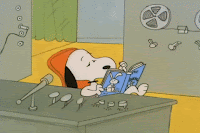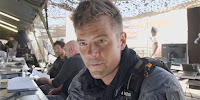Last week
I talked about action and I almost spun off on a whole little semi-related tangent. I
cut myself off there, but I still want to talk about it, ‘cause it’s one of those things that comes up a lot. And people get it wrong a lot.
What I wanted to address (
revisit, really) is that old chestnut that gets dragged out in almost every writing class or discussion or guru-lecture.
Start with action. I’m guessing you’ve heard it once or thrice, yes?
Probably just this year.
The problem here is action. Most people see that word and think of… well, all that stuff we talked about last time. Car chases. Ninjas fighting cyborg lizard men. Giant two-headed shark attacks!
So, naturally, this is what they begin with. They come up with a reason to begin with a bank heist. Or a plane crash. Or an armed home invasion. Which is kinda weird in a romantic Christmas story, but you’ve gotta start somewhere, right? And we need to start with action!
To be clear, this almost never works.

If you follow me on Twitter, you’ve probably seen me do one of my Saturday geekery binges, watching
three or four bad B-movies in a row. And one of the most common problems they all have is that they
start with action. Something crashing to Earth and killing some rednecks or, y’know, a giant two-headed shark attack. Usually in three feet of water. Most
giant two-headed shark attacks occur in three feet of water.
But every time, these action-packed events involve people we don’t know and have no investment in. Which immediately lessens the action because it’s not involving anyone I care about, it’s just… happening. To put it in current events terms, we’ve all seen the news about hundreds of thousands of people dying across the globe from Covid-19—heck, we’re past a hundred thousand deaths just here in the US. And while it’s awful, it’s also kind of abstract… until it’s somebody we know. That’s when it hits home and all this stuff happening really connects with us.
Weirdly enough, as a side note… a lot of time the people in these opening action scenes tend to be awful, so I don’t even have basic human empathy for them. I want them to die, and that can switch the whole tone of my opening. Far too often, these events won’t even end up tying back to the story. They’re just little disconnected blips with characters we’ll never see or hear about again.
When I try to start with action like this, I’m just delaying the actual starting point of the story. And I’m doing it in a way that alienates my audience, too. Why would I want to do that?
And one other problem when I start this way. If I
structure my story so it begins cranked up to eight-point-three, there’s only two things it can do. It can either take a huge hit and drop down to three or maybe four as I establish some kind of norm. Or it can stay up in that top fifteen percent of dramatic tension and be… kind of monotone. I mean, think about it—a whole story where the tension never shifts by more than ten percent in any direction?
So… why does start with action keep getting parroted around?
As I mentioned last time, there’s more to action than just swordfights. My typing all this up for you to read is action, and you reading it is action. Getting lectured by your boss, trying to get to class on time, cooking dinner, mowing the lawn… All of these things are action. They’re things happening.
More importantly, I think, is they’re actions we can all immediately understand, and they’re actions that can easily tell us something about the people involved in them.
Take mowing the lawn for example. How old is Wakko? Is he mowing his lawn or someone else’s? Why is he mowing it? How much effort is it for him? What’s he thinking about while he’s doing it? These are all really easy questions to answer while he’s pushing the mower back and forth. So something’s happening, we’re meeting the character, and maybe even getting to set up some simple, basic stakes.
Also, just to stop one train of thought real quick—yes, thinking is technically an action. So is fantasizing, realizing, remembering, reading, staring into space, and many other such things. But the key thing to remember here is all of these are really just Yakko
sitting at his desk and not moving. So really… nothing’s happening.
And we want to have something happening. Something that falls in the middle ground between daydreaming and demon ninjas roaring down the street on AI-guided murdercycles. I mean, just off the top of my head, let’s look at some action-filled books and movies and see how they start…
Captain America: The Winter Soldier begins, as I’ve often pointed out, with the two main characters doing their morning jogs.
Fractured Tide by Leslie Lutz begins with a young woman writing/narrating a letter to her father, warning him not to come looking for her.
The Last Adventure of Constance Verity by A. Lee Martinez begins with the main character trying to explain her very thin resume at a job interview.
Sarah Kuhn’s Heroine’s Journey begins with the main character reshelving books in a book store while she complains about her older sister not taking her seriously
My latest book,
Terminus, begins with a guy half-listening to a sermon being given on a beach at night. Heck,
Ex-Heroes, the post-apocalyptic superheroes vs. zombies book that launched my career, begins with two people on guard duty chatting while a zombie keeps bumping into the wall below them.
Hell, you want an absolutely crazy one? Do you remember how the
Transformers movie begins? Yes,
Transformers by Michael “it still needs more explosions” Bay? A bunch of Army Rangers get back from a long patrol and hit the showers while their CO goes to call his wife and baby daughter. Seriously. That’s the opening of the movie.
And again, they’re all starting with action… but they’re not starting with
action! They’re putting us right into the ongoing story. They’re introducing us to characters rather than slamming us into them.
They’re catching our interest and drawing us in. Getting us invested. Making us want to read more.
Which is a pretty good way to start a book.
Next time, I’d like to share a special message with you.
Until then, go write.




